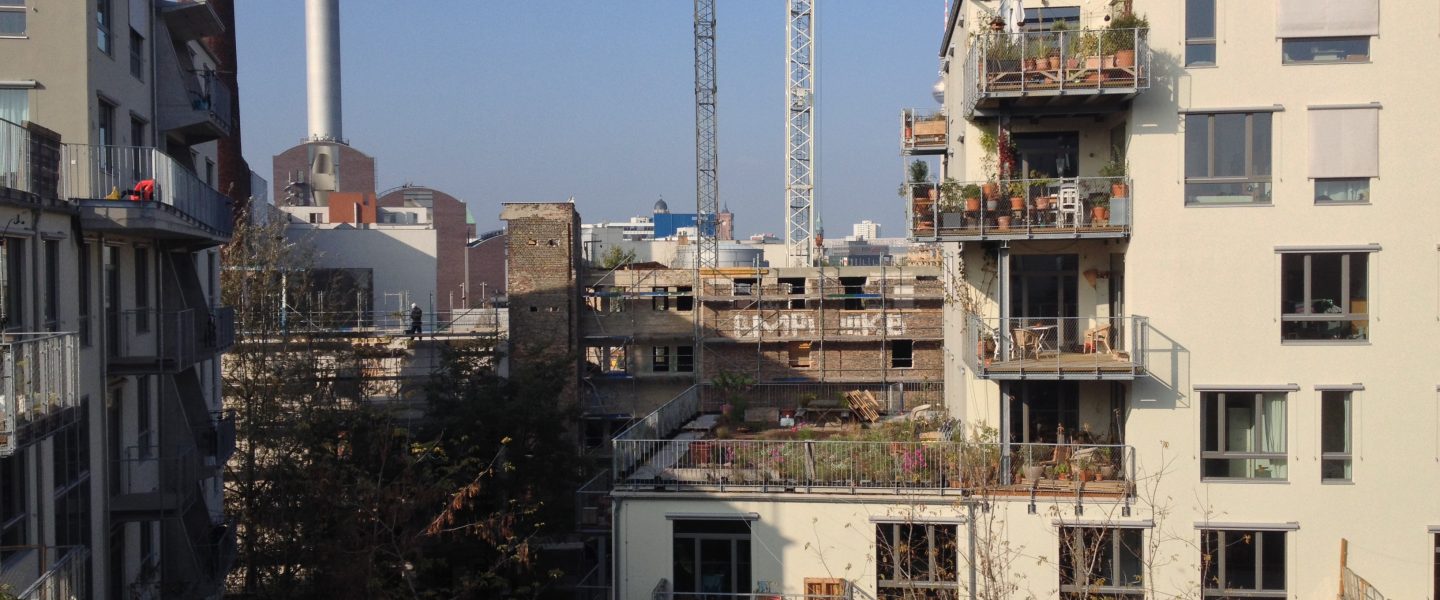
Spreefeld Housing Cooperative, Berlin. Photo: Eutropian
EKA maja, auditoorium A501
Start Date:
29.12.2024
Start Time:
18:30
End Date:
29.12.2024
The next lecturer of the Open Lecture Series this autumn semester will be Levente Polyak, stepping on the stage of the new EKA building (auditorium A501) on the 18th of October at 6.30 pm to talk about funding the cooperative city.
Levente’s lecture is titled “Funding the Cooperative City: Community Finance and the Economy of Civic Spaces”. In recent years, cultural, social, community and educational spaces have become laboratories of new forms of living, working, learning and collective exchange. However, these civic spaces face many difficulties in establishing stable economic structures, or lack financial buffers to secure their long-term operations and relative autonomy. The research and advocacy project Funding the Cooperative City has explored how citizen initiatives, cooperatives, non-profit companies, community land trusts, crowdfunding platforms, ethical banks and anti-speculation foundations step out of the regular dynamisms of real estate development and arrange new mechanisms to access, purchase, renovate or construct buildings for communities. The research has brought together a variety of actors, practices, models, mechanisms and opinions that address these difficulties. Funding the Cooperative City builds on their experiences to help and inspire civic space initiatives in accessing community capital, building stable financial models, strengthening local economies by keeping profits in neighbourhoods and ensuring spaces against public oppression or the extraction economy.
Levente Polyak is an urban planner, researcher, community advocate and policy adviser. After studying architecture at Budapest University of Technology, urbanism at the Institut d’Urbanisme de Paris and sociology at ELTE Budapest, and EHESS Paris, he was a visiting lecturer at the Moholy-Nagy University of Art and Design, the Budapest University of Technology and TU Wien. He was also a visiting fellow at Columbia University and the École nationale supérieure d’architecture Paris-Malaquais and holds a PhD in Sociology from the Central European University. He has worked on urban regeneration projects for the New York Department of City Planning, the Délégation à la Politique de la Ville et à l’Intégration in Paris, and the Assessorato della Rigenerazione Urbana in Rome.
In 2012-13, he was an adviser to the Head of Urban Planning in Budapest and contributing editor of the Budapest 2030 Urban Development Strategy. He is the editor of Cooperative City, co-founder of Eutropian Research & Action (Vienna-Rome) and member of the KÉK – Hungarian Contemporary Architecture Centre (Budapest). While in Budapest, he was leading KÉK’s Lakatlan programme to help NGOs and social enterprises access space and economic sustainability, and in Rome he initiated the URBACT network Temporary Use as a Tool for Urban Regeneration. As an expert of the URBACT and Urban Innovative Actions programmes, he has been coordinating international knowledge exchange networks between municipalities in various countries of Europe. Specialised on urban regeneration, cultural development, community participation, civic economy, social innovation and local resilience: in these themes, he has been supporting public administrations and NGOs of various sizes and geographic locations across Europe in creating spatial development projects and new governance models.
Currently he is serving as a consultant to the Citizens’ Dialogue series of the European Investment Bank and the Committee of the Regions. His recent books include Vacant City: Experiments in Inclusive Urban Regeneration (2015), Civil Város: Lakatlan ingatlanok a közösségek szolgálatában (2016) and Funding the Cooperative City: Community Finance and the Economy of Civic Spaces (2017).
The architecture and urban design department of the Estonian Academy of Arts has been curating the Open Lectures on Architecture series since 2012 – each year, a dozen architects, urbanists, both practicing as well as academics, introduce their work and field of research to the audience in Tallinn. All lectures are in English, free and open to all interested.
The series is funded by the Estonian Cultural Endowment. Levente Polyak’s lecture is part of the Future Architecture program which introduces and celebrates innovation, experimentation and the ideas of a generation that will design the architecture and build Europe’s cities in the years to come. See: http://futurearchitectureplatform.org.
Curators: Sille Pihlak, Johan Tali
https://www.facebook.com/EKAarhitektuur/
More info:
Pille Epner
E-post: arhitektuur@artun.ee
Tel. +372 642 0071
